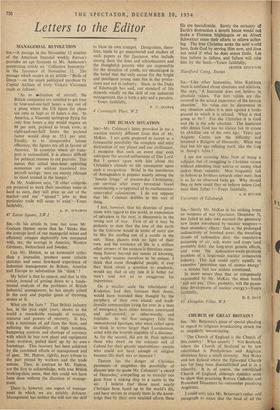Sm,—In his article in your last issue Mr. Graham Hutton
states that he ' thinks that the average level of our managerial talent and efficiency remains deplorably low compared with, say, the average in America, Western Germany, Switzerland and Sweden.'
Can Mr. Hutton, as an economist rather than a journalist, produce some reliable statistics and some first-hand experience of industrial management in Britain, America and Europe to substantiate his think ' ?
My belief is that he cannot, and that in this article, instead of getting down to a funda- mental analysis of the problems of British industrial management, he has simply joined In the easy and popular game of throwing stones at it.
What are the facts ? That British industry has, in the past eight years, shown to the world a remarkable example of tenacity, resource and powers of recovery. It has, with a minimum of aid from the State, and suffering the disabilities of high taxation, -hampering controls and shortage of currency with which to buy new plant and equipment from overseas, pulled itself up by its own bootstraps. This recovery has been achieved by the combined efforts of management and of men. Mr. Hutton, rightly, pays tribute to the part played by workers and the trade unions. They, in contrast to Mr. Hutton, are the first to acknowledge, with true British working-class sense, that this could not have been done without the direction of manage- ment.
There is, however, one aspect of manage- ment in which we are notably deficient. Management has neither the will nor the skill
to blow its own trumpet. Denigration, there- fore, tends to go unanswered and readers of such papers as the Spectator, who include among them the dons and schoolmasters and the thoughtful parents who are responsible for the direction of youth, are encouraged in the belief that the only career for the bright and intelligent young man lies in the profes- sions and not in industry. Since, as the Duke of Edinburgh has said, our standard of life depends wholly on the skill of our industrial management, this is both a pity and a paradox.
—Yours faithfully, • 4 Connaught Place, W.2
F. C. HOOPER








































 Previous page
Previous page